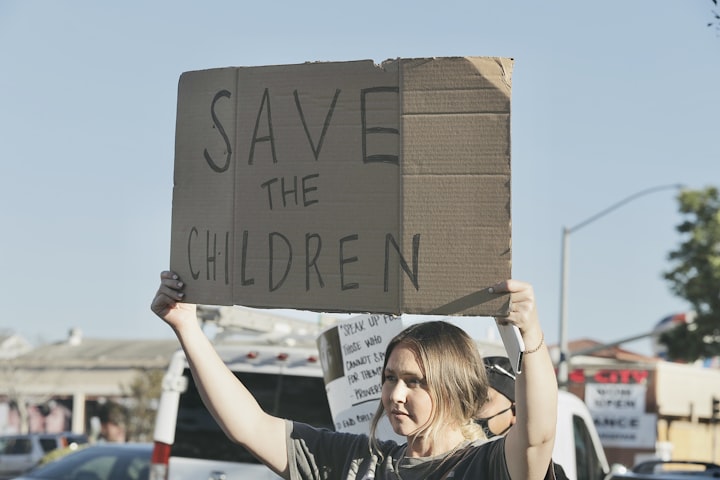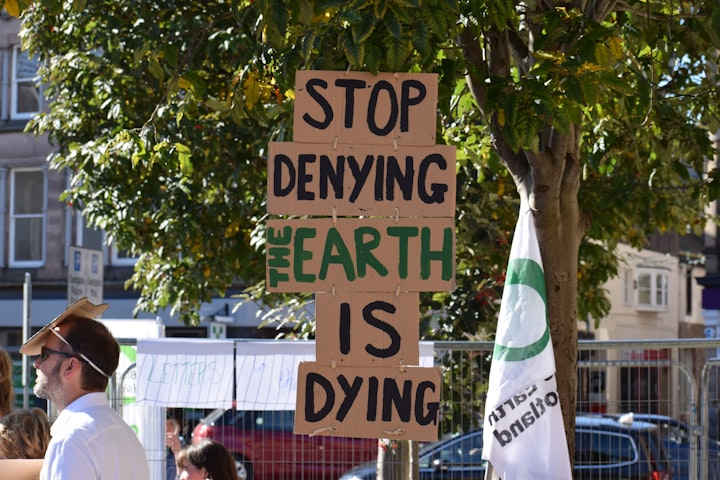5 Reasons Why People Become Conspiracy Theorists
Misinformation Is One Of The Greatest Dangers We Face

Behind every comment ever made, however ridiculous, dangerous, harmful or hurtful, I always try to remember there's a person - and they may have strong reasons for saying something which, on the surface, I think is stupid.
The trouble is, life today is awash with deep divisions, false stories and conspiracy theories. If you try to heal the wounds on social media with your own comment, you're likely to make it even worse.
So I try to ignore the Covid deniers, the climate crisis deniers, QAnon, the 5G conspiracy theorists, those that claim voting has been rigged… but it's not easy, is it?
Why don't people believe the facts?
There are a number of reasons for being a conspiracy theorist, or just plain not believing what experts have told you. I'm going to be charitable first…
1. People are scared
This reason is heavily linked to mental health. Sometimes the weight and seriousness of the problem is too much for a person to bear. They really don't need to hear any more bad news, life has maybe been tough enough already.
But the fact that so many people are dying… more than a million around the world… that's scary, there's no doubting it. How do you cope with such devastating news? Denial is a good starting point.
Incidentally, if things don't go your way, such as losing an election, you can also turn in on yourself, put your fingers in your ears, sing "Blah blah blah!" and deny anything bad is happening. But the truth does catch up with you in the end.
2. People are lazy
A simple truth. People who, without apparent reason (though they might latch on to a conspiracy theory if pressed on the matter), will say "I'm not wearing a mask" or "I'm not recycling my garbage" or "They can't stop me smoking" or "I'm not getting vaccinated."
They do this because they just can't be bothered changing their ways. They have a set routine, they do things the way they like to do them, life ambles along and they just want everything to remain the way it always has been.
Whereas most of us realise that life just isn't like that, and those who get on are those who can adapt to changing situations.
3. People claim to be more independent than ever
Science denial can heavily relate to a person's identity . We've heard plenty from the people who believe in "free choice" to do whatever they want, basically - and presumably to hell with the rest of us.
There's a point when this stubbornness usually declines - perhaps when a relative dies of Covid-19, or they find themselves on a ventilator.
4. People are uneducated
This is a failure of governments around the world, and a failure of some media not to tell both sides of the story.
You do listen to some people, or read their posts on social media, and wonder if they ever went to school. There's an embarrassing degree of misunderstanding the facts out there.
But many people don't perform well in educational settings. Many people also have no interest at all in politics, and engage only at the time of elections or referendums. That's when we rely on the media to educate people.
Regional media, by and large, can be trusted. If facts are wrong in your local newspaper, it will more likely be down to incompetence than a secret agenda (I was a journalist for 30 years, so I know what I'm talking about, sorry to burst your bubble).
National media is a different matter. Generally owned by billionaires with their own political agendas, editorial bias tends to be slanted to the right, with fewer publications looking at the world from the left. And even fewer looking both ways.
Sadly, not many in the mainstream media (you'll see conspiracy theorists calling them 'MSM') remember the basics when it comes to journalism - get both sides of the story and present a balanced view.
Which links in to the final reason for denying the facts - a scourge on modern society and the main obstacle to persuading people about uncomfortable truths…

Science has been politicized
Science, of course, builds knowledge and understanding of life, the universe and everything, based on evidence. Yes, predictions and theories are everywhere in science, but only based on facts.
We all unconsciously live our lives within a framework of understanding about the world around us, which has been confirmed over time by scientists.
But the minute the experts reveal something that grates against certain political views, there's a problem.
And it's one thing if the average person in the street starts to distrust the science, it's another thing entirely if the elites in politics and media actively shoot down the theories - that's when falsehoods become weaponised and dangerous.
So maybe there is a scientific view about why Covid-19 cases are spiralling out of control - too much close contact, for example - and this by nature suggests that the government of a country hasn't got a grip of the situation. Maybe a president or prime minister might start deflecting the blame away from themselves…
A meta-analysis published in Nature Climate Change in 2016 showed that political orientation was among the strongest predictors of climate change belief.
The failure of many people to acknowledge the serious nature of climate change, also Covid-19, cannot be explained by a lack of information - that is evident all around us.
Instead, an individual's political persuasion will shape their opinion on whether or not to believe the facts. If science points to a failure of government, science will get the blame.
At the same time, let us not forget another obvious truth related to politics and facts. Many people have been burned too many times, they simply don't trust politicians, and that is their reason for not believing some of the information - even if politicians weren't the original source.

Fighting off fake news
We can try to fight back with facts - that's the obvious solution - but in this crazy world we are now living in, the most powerful people in the world can scream "fake news" and those sharing their political opinion will believe them.
Most of us are acutely aware, for example, that when Donald Trump cries "fake news!' it actually means "this is the truth, but I don't want you to know that."
But there is a frightening amount of misinformation out there. Fake news is a dangerous reality, just not in the way it has been politicised.
There is a darker underbelly to the fake news machine, with governments, criminals, campaigning groups and vindictive individuals spreading misinformation, designed to cause mistrust or anxiety, to promote an ideology, harm competitors or opponents.
Oh, and by the way, much of this fake news pays handsomely. More clicks means more ad revenue.

Should we be harsh on conspiracy theorists?
There are reasons, as I have outlined, that people might not get on board with what appears to be solid evidence.
I accept that we are not all alike, and I shouldn't judge people based on my own criteria, reasons, knowledge and background for establishing what information is real and what is not.
But I will say this directly to conspiracy theorists, if any are reading (feel free to pass this on to any you know)…
If you wanted to get your car fixed, you would ask a mechanic. If you wanted your light fittings checked, you would ask an electrician. If you had a growing lump in your leg, you would seek advice from a doctor.
These experts are so-called because they have gained expertise through years of study, training and real-life experience. They know what they are talking about. They are not politically motivated.
So when it comes to finding out if climate change is real, ask a scientist specialising in the subject. When it comes to finding out facts about Covid-19 and the truth about vaccines, ask an epidemiologist.
Don't rely on information from random Brad on YouTube. Real experts tend to publish their findings in medical journals, following extensive research.
And conspiracy theorists call people like me "sheep."
Know this… those who oversee the spread of misinformation can only do their dirty work if they have a flock of people on social media who are gullible enough to believe and share what they are claiming.
Please, don't try to pull your wool over my eyes.
About the Creator
Mark Campbell
Journalist and blogger, editor of greengreengreen.org, on a mission to inform, educate and entertain






Comments
There are no comments for this story
Be the first to respond and start the conversation.